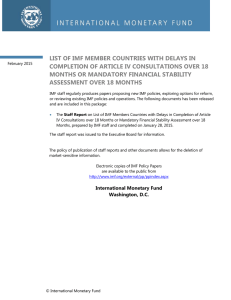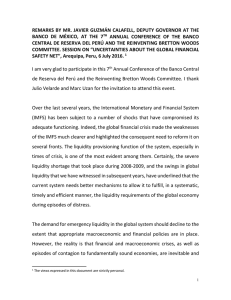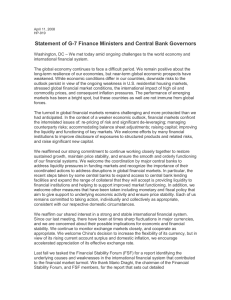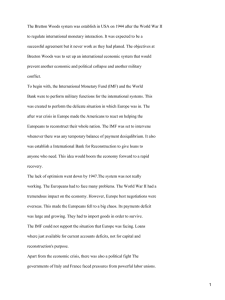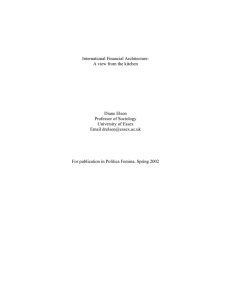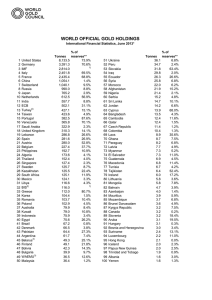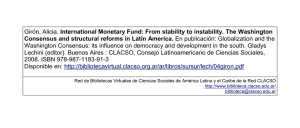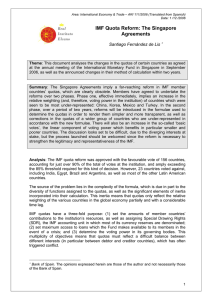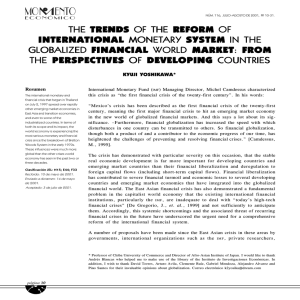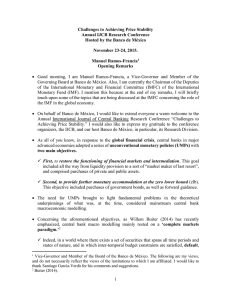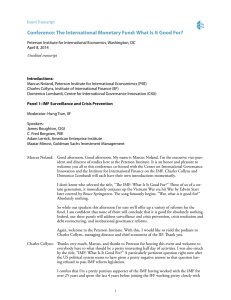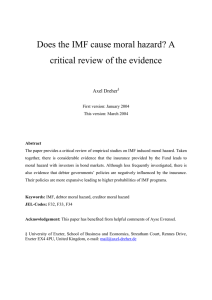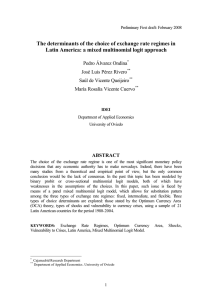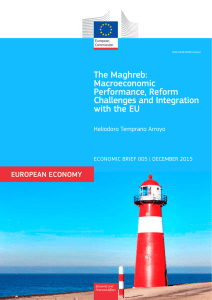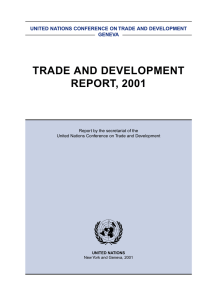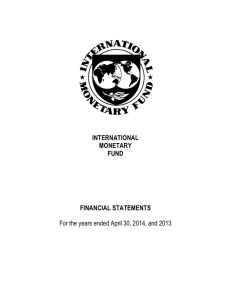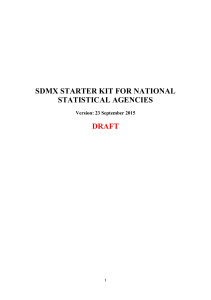International Monetary Fond
Anuncio
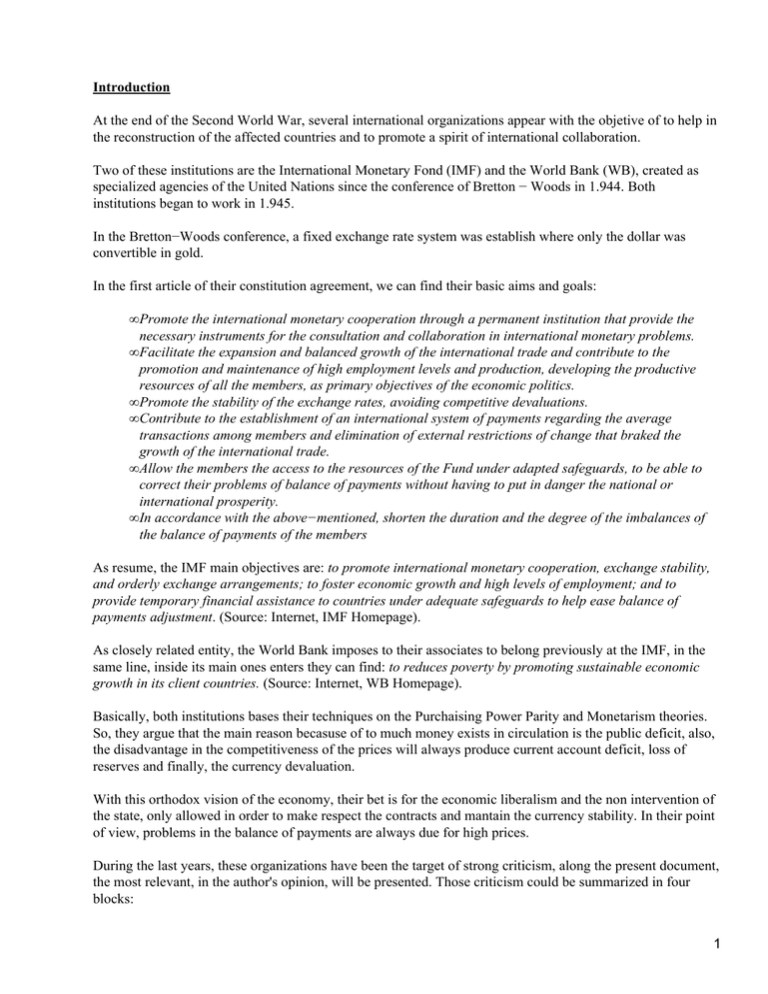
Introduction At the end of the Second World War, several international organizations appear with the objetive of to help in the reconstruction of the affected countries and to promote a spirit of international collaboration. Two of these institutions are the International Monetary Fond (IMF) and the World Bank (WB), created as specialized agencies of the United Nations since the conference of Bretton − Woods in 1.944. Both institutions began to work in 1.945. In the Bretton−Woods conference, a fixed exchange rate system was establish where only the dollar was convertible in gold. In the first article of their constitution agreement, we can find their basic aims and goals: • Promote the international monetary cooperation through a permanent institution that provide the necessary instruments for the consultation and collaboration in international monetary problems. • Facilitate the expansion and balanced growth of the international trade and contribute to the promotion and maintenance of high employment levels and production, developing the productive resources of all the members, as primary objectives of the economic politics. • Promote the stability of the exchange rates, avoiding competitive devaluations. • Contribute to the establishment of an international system of payments regarding the average transactions among members and elimination of external restrictions of change that braked the growth of the international trade. • Allow the members the access to the resources of the Fund under adapted safeguards, to be able to correct their problems of balance of payments without having to put in danger the national or international prosperity. • In accordance with the above−mentioned, shorten the duration and the degree of the imbalances of the balance of payments of the members As resume, the IMF main objectives are: to promote international monetary cooperation, exchange stability, and orderly exchange arrangements; to foster economic growth and high levels of employment; and to provide temporary financial assistance to countries under adequate safeguards to help ease balance of payments adjustment. (Source: Internet, IMF Homepage). As closely related entity, the World Bank imposes to their associates to belong previously at the IMF, in the same line, inside its main ones enters they can find: to reduces poverty by promoting sustainable economic growth in its client countries. (Source: Internet, WB Homepage). Basically, both institutions bases their techniques on the Purchaising Power Parity and Monetarism theories. So, they argue that the main reason becasuse of to much money exists in circulation is the public deficit, also, the disadvantage in the competitiveness of the prices will always produce current account deficit, loss of reserves and finally, the currency devaluation. With this orthodox vision of the economy, their bet is for the economic liberalism and the non intervention of the state, only allowed in order to make respect the contracts and mantain the currency stability. In their point of view, problems in the balance of payments are always due for high prices. During the last years, these organizations have been the target of strong criticism, along the present document, the most relevant, in the author's opinion, will be presented. Those criticism could be summarized in four blocks: 1 • Technical errors in looking for solutions. • Lack of social conscience. • Omission of the environmental problems. • Lack of ethic. Technical errors in looking for solutions One of the goals the IMF looks for is to mantain the exchange rates and avoid the devaluations, however, some of the measures offered send a message of distrust on the economic politics of the countries in crises. As consequence, an abrupt situation of capital exit that affects to the reservations of foerign exchanges happen in those countries. Therefore, this situation generates the unavoidable devaluation of the currency of the affected country. A example of this situation, is the crisis in the Asiatic markets, in this case, the IMF abruptly closing financial institutions throughout Asia, sending a remarkably abrupt, unprepared and dangerous signal that you had better take your money out or you might lose it. (Source: Article TO STOP THE MONEY PANIC from Jeffrey Sachs, Asiaweek February 13 1.998). Another argument promoted by the IMF is the liberation of capital flows because it is something positive for the world economy and provide greater opportunities for borrowers and lenders. This argument has been defended by the IMF directors since the beginning of the institution, but, since the financial crisis of 1.997 and in opinion of Michel Camdessus (IMF Managing Director during 12 years and recently resigned): The economic models are not eternal. At some moments they are useful and in others, with the evolution of the world, they are out of date and they should give way . (Source: El País, November 14 1.999). In many occasions, the WB offers loans to the countries that are in troubles in order to finance development projects, however, the refund of these loans is another problem for the borrowers when they have to offer as compensation the opening of its financial markets and to allow powerful foreign banks buy the national ones, besides the evident lack of security that the lenders has of recovering that money. This situation makes to be in danger the economic system where both institutions are constructed. Manuel Guitián, ex IMF Director said debt problems have been presented that, instead of being located in a country, they were extended to a numerous group of nations. (Source: El País, November 21 1.999). In 1.996 according to the WB and the IMF eight countries have an unsustainable debt burden: Mozambique, Sudan, Zaire, Zambia, Burundi, Guinea Bissau, Nicaragua, and Sao Tome and Principe. Twelve more countries are possibly stressed: Bolivia, Cameroon, Cote d'Ivoire, Tanzania, Uganda, Congo, Ethiopia, Guyana, Madagascar, Myanmar, Niger, and Rwanda. In opinion of the bank and the fund, a debt burden is sustainable when a country is able to meet its current and future external obligations in full, without recourse to relief or rescheduling of debts or the accumulation of arrears, and without unduly compromising economic growth. (Source: Eurodad Information Sheet, April 1.996). Lack of social conscience Indebted countries, often are forced to respond to some high debts that force them to diminish budgetary departures of vital importance, most of the times reducing to the minimum the social expenses, example of this situation are Zambia and Ethiopia, they dedicate twice more to pay the debt than what they use jointly in health and education. The countries of the third world have paid in 1.997 to their creditors five times more than what they received in concept of help, moreover, with the lack of security of the rich countries about the possibility of to recover the credits, they have not assisted the demands of credits from the poorest countries for more than 10 years. 2 (Source: El País, November 21 1.999). On the other hand, both entities are cold and totally isolated from the really poorest people. Macroeconomic measures are incomprehensible for most of the people of the poorest countries and the only thing they can see is the increase of problems when disappear, many times, the limited social help they had, for example, mesures imposed to Thailand and Indonesia based on strong cuttings of the public expense, free exchange rates and high interest rates. In words of Joseph Stiglitz, ex Economist Chief of the WB, The IMF must be less cold and distant entity for those that more depends on their help. (Source: El País, November 27 1.999). Another measure frequently imposed by these organisms, is the liberalization of the imports, this liberalization in occasions generates the substitution of internal and cheap products for other more expensive coming from abroad. Only a small elite can have access to those products, this accentuates the distance between social classes, often producing the elimination of the peasant class. Another clear example of the situation caused by the indebtedness of the poorest countries is the distribution of the wealth, data from the 1.992 report of the program of United Nations for the Development affirm that if in 1.960 20% of the inhabitants of the Earth monopolized 70% of the revenues, in 1.989 that same 20% monopolized 83% of the revenues. (Source: El País, March 6 1.994). Finally, President Clinton in the last assembly of the IMF/WB affirmed: An untenable debt is helping to maintain in the poverty too many poor countries and needy people. . (Source: El País, November 21 1.999). Omission of the environmental problems Steve Graham, member of AEDENAT (Spanish Association for the Defense of the Nature) affirms that the projects of highways have desolated forests and tropical forests. IMF/WB don't coincide with United Nations in the position of solutions when omitting human magnitudes and only focus in macroeconomics issues. In many occasions, IMF/WB force the countries to carry out techniques of monocultivation that generates a fall of the prices of vital products for their economies, example of this situation is the cocoa or the chromium in African countries. (Source: El País, March 6 1.994). In a letter sent in 1.996 to World Bank president James Wolfensohn, the Environmental Defense Fund (EDF) along with numerous environmental and energy conservation organizations worldwide expressed deep concern and disappointment over the World Bank's recent "eleventh−hour" downgrading of its energy policies to non−binding "good practice" documents rather than binding operational policies. "We find this matter particularly disturbing because it weakens the recent resolve of governments worldwide to negotiate by next year a legally binding protocol to the 1992 Rio Climate Convention, with legally binding greenhouse gas emission reduction targets", said Karan Capoor, EDF policy analyst. "The World Bank's issuing of its new energy policies as non−binding 'good practices' stands in stark contrast to where the rest of the world is moving: binding urgent action on global climate change.. The Bank's recent actions constitute a wholesale dismantling of its energy−related environmental. (Source: Internet, EDF Homepage). Lack of ethic The credits granted by the WB from 1.947 and up to 1.984 reached an amount of 101.565 million dollars, in 1.987 the 151 members of the IMF paid quotas up to 89.987 million dollars. (Source: Encyclopedia Salvat, 3 edition of 1.991). These astronomical figures combined with the little control that, a lot of times, the receiving governments of the debts exercise, generate situations of corruption that question the credibility of the institutions. In fact, The World Bank has suspended from employment to three high representants after suspecting that some of these officials, directors of multimillionaire programs of help to the developing countries, have been pocketed illegal commissions. The World Bank president, James Wolfensohn, has hired the services of two auditor companies. These companies have to analyze the bills of the entity, study their programs and locate the money that is suspected of disappearing. The bank has presented a demand to recover most of a program of 65 million pesetas that was granted to a company to build preys in Algeria. Another implied person, it is the one in charge from loans to Japan that could have used a private bill for the employees' of the bank expenses in their personal enjoyment. (Source: The World, July 17 1.998). Another example is the situation in Russia where people from the president Yeltsin family are accused of to deviate funds of help to private bills with the passivity of the international monetary authorities. Summing up As summary, it is possible to say that both institutions impose the following measures in order to help to the countries in troubles: • To control the money circulating in order to lower the prices. • To control and to reduce of the public expense. • To increase the public revenues. • To reduce the tariffs. • To liberalize all the economic transactions (work market, capital market and elimination of public monopolies). This vision of the economy has not varied since the foundation of both institutions, although the socio−political world situation has changed in a spectacular way, a clear example is that since 1.973 when Nixon eliminated the convertibility of the dollar in gold, one of the pillars where both institutinos are based has disappeared, this is a fixed exchange rate system based on the dollar standard. Who is the boss in those institutions?, this is a question that we can do, another of the most frequent accusations against IMF/WB is to defend the interests of UU.EE. exclusively. With the vote system that exists in these institutions, where the weight in the decisions comes from the quota each country pays, it is evident that the biggest power of decision relapses in the richest countries (UU.EE. contributes with a 18% of the quotas while all the European countries add a 12%). Under the author's point of view, an unique solution doesn't exist for the problems and, of course an eternal solution doesn't exist for the same problem along the years. The creation of both institutions came marked by a crucial historical moment in the humanity's history that was the end of the Second World War. Europe was practically destroyed, the world seemed that it was limited to the capacity of UU.EE., in that moment, a concern didn't exist for the situation of poverty and sub−development in Africa or countries of Asia. In the Middle East, the problems remained without solving and today they are still, in many cases, in full present time. 4 With the situation of destruction in Europe, it seemed something logic to look to the future thinking in long term projects of reconstruction and in giving to UU.EE. the responsibility of commanding the search of solutions, but today the situation is another, Europe is a strong competitor of UU.EE. in many sectors, the same thing happens with Asia. The situation of the African countries is probably the one that less has changed, but the globalization makes that isolated territories where don't affect the problems of other countries don't exist. This change of world situation and that globallización make, under the author's point of view, that is necessary to outline new solutions to old problems in their origin, but that with the step of the time have changed. In what sense?, basically with three starting criteria: • More weight in the search of solutions of the less rich countries. • Increase the international control of the funds dedicated to help. • More social conscience. Finally, as last thinking we can take it from the book The Stability of the International Monetary System, Author W. M. Scammel: No system could be expected that lasts more in an effervescent world and in political transition. That lasts the whole period of recovery and growth of the postwar period and it was only discarded when in the international economy quite fundamental changes had taken place, it is indicative of their quality. 3/5 5
